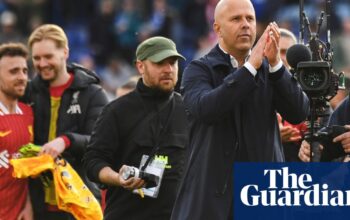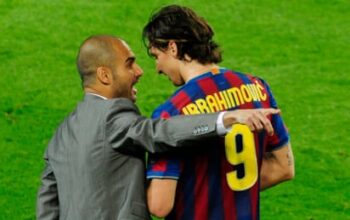The plight of the unemployed manager is a curious phenomenon, one that lurches from loss to loneliness and quite often a long, hopeless struggle to get back in. It can last forever, or for no time at all, but it is always challenging and usually it begins with a sacking.
Mark McGhee has been dismissed frequently enough to know it shouldn’t be taken personally, but he will never forget the first time. After four uninterrupted years as the manager of Reading and then Leicester City, his three years at Wolverhampton Wanderers came to an abrupt end when, after successive failures to win promotion, he presided over just two wins in 12 matches.
First, there was the meeting at which he was told to pack his bags, then there was the introduction to “real life” for the first time in his long career as a manager and player. But what McGhee remembers most is the feeling a few days later when he saw first-hand that Wolves would carry on perfectly well without him.
“The following week, I got a phone call from big Mick [McCarthy] who was the Republic of Ireland’s manager at the time,” McGhee says. “He asked me to go to a game at Blackburn, watch the Irishmen who were playing and send him a report. He was doing me a favour really, getting me out of the house and keeping me involved.
“So that was great. But in order to go from where I lived, out near Bridgnorth, to the motorway, I had to drive on the stretch of dual carriageway that goes behind Molineux. And when I drove past, there was a game on, an early kickoff presumably. It actually brought tears to my eyes. Literally a week earlier, I had been king of the castle down there. And here I was, driving along, with it all going on in my absence. It was so emotional.”
This, then, is how it feels for former managers: sad, dispiriting and a little surreal. The sudden jolt from an all-consuming, 24/7 obsession with who to pick and how to make the team better is replaced the following morning by walking the dog and watching Homes under the Hammer.
It’s alright for José Mourinho, who is thought to have received £82m in compensation over the years. McGhee feels for managers further down the food chain who wonder if they can afford to keep chasing the dream. “They have not accrued vast amounts of money. They need to pay the mortgage and feed their families. Some of these young guys go straight into management, lose their job and suddenly they’re out on the street. It can be brutal.”
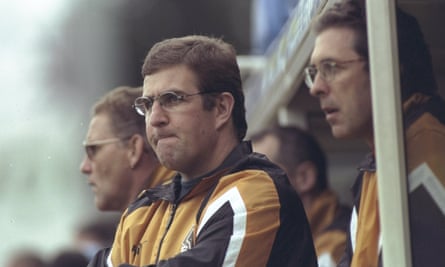
Mentally, it can be even worse. Gone is the camaraderie, the structure of a working week and the artificial life that is all they have known. Steven Pressley compares it to a soldier being discharged from his duties. “A lot of people whose career in the military has come to an end find themselves suffering depression,” he explains. “Football is similar in some respects. Players struggle when they retire but, as a manager, you also carry enormous pressure, so much so that you just feel really alive. You are properly living. Then, almost overnight, you have nothing. It’s like withdrawal from a drug.”
After a career in which he played for Hearts, Dundee United and both halves of the Old Firm, Pressley managed Falkirk, Coventry City, Fleetwood Town, Pafos and Carlisle United before settling into his current, altogether more stable, job as Brentford’s head of individual player development. He recalls how hard it was for him, an ambitious, ultra-competitive young manager, to accept rejection.
“I’ve been through several disappointments as a manager. The early ones hit me quite hard because I was young, with a large ego, and was desperate to manage at the very top. Those knocks can make you a better person, but it doesn’t feel like it at the time. There isn’t a lot of support. After it happens, you get calls and text messages, but it only lasts 48 hours. Then, when the phone stops ringing, it can get very lonely. That’s why I always bring people in to Brentford when they lose their job. I know it’s not easy.”
Alan Pardew, a high-profile veteran of the sack race, has said that the rehabilitation phase tends to comprise three stages. The first is an extended holiday or a complete break from football so that perspective can be attained. Then there is a period of honest reflection in which you ask yourself what you would do better next time. And, finally, there is the comeback, a protracted, sometimes thankless effort to re-enter the madhouse.
For many, that means deepening one’s knowledge by calling in a few favours and visiting other clubs. Pressley studied how Atlético Madrid trained under Diego Simeone, as well as Real Sociedad under David Moyes and Maccabi Tel Aviv when Steve McClaren worked with Jordi Cruyff. These experiences are fun and beneficial, but what comes next, namely positioning yourself for any vacancy that might arise, can be more awkward. Staying visible by attending matches, doing media work and developing key contacts isn’t so easy if, like Pressley, you are not that way inclined.
“I’m not particularly good at networking and self-promotion. It doesn’t come naturally. It’s a weakness, something I wish I was better at. If you look at where people end up in football, it is not necessarily based on the skillset of the individual. It’s about making the right connections at the right time. Quite often, clubs already have their preferred candidate and it’s a done deal. I was brought up to believe that hard work and ability were the most important things, but the longer I’ve been in football, the more I’ve come to realise that they’re not.”
The job hunt can be an unseemly, shady business, especially when it comes to identifying the next opportunity. Managers always insist they would never do anything to unsettle someone still in a post, but the reality is that their agents are doing exactly that on their behalf. As soon as an unfortunate peer goes on a run that leaves them vulnerable, the vultures are circling behind the scenes.
“The job of an agent is to promote their clients,” Pressley says. “They will speak to clubs while managers are still in jobs. That’s normal. It’s a part of the industry that I really don’t like. It’s not something I’ve ever asked of an agent, but it’s something that goes on constantly. There are some naughty people out there.”
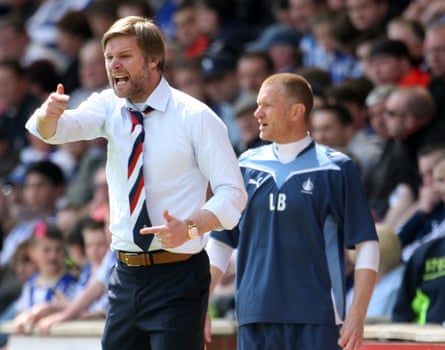
In all probability, when the chance a manager has been waiting for finally comes along, it will not be advertised on the internet, with an invitation to complete the attached application form. It will be the product of groundwork between the club and the agent, whose client has privately indicated an interest.
If contact has not already been made and the application is a cold, speculative one, even the most high-profile managers have come to expect that there might not even be a reply. If, on the other hand, the approach has been subtly encouraged, the candidate has a fighting chance of moving on to the next stage.
The manager’s interview is a fascinating staple of the football diet, repeatedly referred to over the years, with little or no light shed on what it actually involves. Some are stringent examinations of the applicant’s credentials, others a relaxed chat over a liquid lunch. If they are lucky enough to have been headhunted, there might be little more than a handshake in a motorway service station.
McGhee has had some colourful ones over the years. His first, at Reading, was held in a director’s house. He was perched on a dining-room chair in the middle of the room, while a panel of three slouched below him on a sofa. McGhee later discovered that John Madejski, the chairman, had told his colleagues they were to end the interview if he used a secret word. When the businessman inadvertently blurted it out in the opening minutes, they looked at each other askance and sheepishly tried to wrap things up. “Honestly, it was like a comedy sketch,” says McGhee. “One of the directors, Graham Denton, is a good friend of mine, and we still laugh about it now.”
Then there was McGhee’s interview for the Motherwell job in 2007. He met them for dinner at One Devonshire Gardens in Glasgow, where director Stewart Robertson was in attendance, together with club owner John Boyle, who had just been back and forth to the Bahamas on the inaugural flight of his newly founded company, Zoom Airlines.
“Well, John likes a nice bottle of red so we had some of that and halfway through the interview he fell asleep,” McGhee says, laughing. “It wasn’t exactly encouraging from my point of view. But Stewart apologised to me, explained that I’d have to forgive John who had more or less been in the air for 48 hours. And I got the job.”
Thankfully, interviews have come on a bit since then. There are still clubs who see no value in subjecting candidates to a thorough process, not when their track record is already out there for inspection. But more and more are starting to understand that picking who they fancy from a list of names in the media is doing themselves a disservice.
The least they can do is scratch beneath the surface. Why did the applicant fail in a previous job? How will they fit into your culture? Are people’s perceptions of the candidate supported by facts? If they can limit unconscious bias and remain open to persuasion, they will enhance their chances of making the best decision.
Increasingly, clubs expect applicants to “present themselves” so that, rather than simply answer questions, they have an opportunity to demonstrate, perhaps with the aid of PowerPoint visuals, what they would bring. This is now a fundamental part of the process at bigger, more corporate clubs.
Gary Caldwell has talked about his unsuccessful application to become Manchester City’s under-23 manager, the three-hour interview for which was supervised by nine staff. He made two presentations and was asked, in another room, to pick up a series of cards and explain how he would deal with the scenarios on them. He didn’t get the job.
That would not be required of prospective first-team managers, especially at smaller clubs, but there is no doubt about the direction of travel. That Aberdeen engaged a consultancy firm to oversee, among other things, the appointment of their current manager, is an indication of the changing landscape.
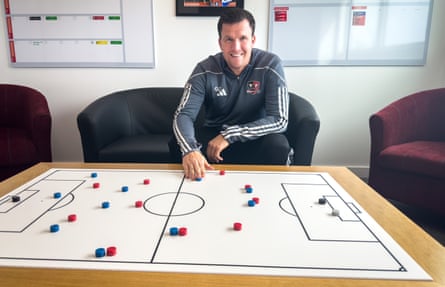
Stewart Macgregor is the managing director of Football Careers, a company that operates on both sides of the fence. As well as offering consultancy services to clubs who are recruiting, it assists out-of-work players, coaches and managers with everything from graphically designed CVs to glossy philosophy brochures and interview training.
He has three key recommendations for unemployed managers. First, they must market themselves, if not with CVs and LinkedIn, then definitely by maintaining a profile in and around the game. Second, they must busy themselves with work that will prove to be useful, such as visiting clubs, attending matches and scouting. Third, they must learn to present themselves well, however uncomfortable they are with the idea.
“Unless they have already identified you as the person they want, the majority of clubs will now have you present to them,” Macgregor says. “I’ve had a client who, at one stage or another, has been interviewed for most jobs in the Scottish Championship. And on every occasion that was the case. So get a few slides together and use data. Basically, show them why the last manager was dismissed.”
Macgregor has plenty more tips, one of which is to have a backroom team ready. “If they ask you about that, and you don’t have an answer, there are negative connotations. They want to see that you are prepared and organised. They want to be impressed by you, but it helps if they are also impressed by your assistant.”
With a background in the corporate world, Macgregor believes managers who refuse to market themselves are limiting their options. “What’s the harm in it? It’s not going to guarantee you the job, but don’t let yourself be excluded. If you want to get back into the game, these are things you need to do. Otherwise, you risk being out for a while.”
That said, football will never be like other industries. However thorough the recruitment process, the ultimate decision will be subjective, based more on instinct than the demands of an HR department. Even the biggest clubs, if they are doing their jobs properly, will have a succession plan long before the vacancy arises. While Macgregor undertook some research showing that a success in England’s second and third tiers tended to earn a manager three more hits, he acknowledges that it is tough to get that opportunity in the first place.
The longer you are out, the more likely you are to be forgotten. Clubs follow trends, they are tempted by flavours of the month and they are influenced by the media. McGhee says he has come across chairmen who are attracted to a manager’s profile and, with it, the friends they might make by appointing him. In addition, there are always other managers succeeding elsewhere and newly retired, celebrity players making the marketplace even more congested. “It’s not easy to get a job in football,” Macgregor says. “There are so many candidates.”
Kevin Thomson can vouch for that. In his first managerial post, he guided Kelty Hearts to the League Two title, but for two years he has tried and failed to get another crack at it. Since resigning in May 2022 due to a disagreement about the Fife club’s budget plans, the former Hibs, Rangers and Middlesbrough midfielder has been unsuccessful with a number of applications.
It’s a competitive business, as Thomson discovered when he recently attended a tribute dinner for Jimmy Bell, the former Rangers kitman who passed away two years ago. At his table was a cast of friends and ex-teammates – from Stuart McCall, Allan McGregor and Kenny Miller to Neil McCann, Jermain Defoe, Lee Wallace and Steven Davies.
“A lot of the people at that table were in the same boat as me, asking the same thing. Davo is looking for an opportunity, Greegsy’s not sure what he wants, Kenny is looking for another opening. Stuart was waiting for another job with Hecky [Paul Heckingbottom, to whom he has been an assistant]. I suppose I’m humble enough to see that when there are guys like Steven Davies coming through – as well as the odd player like Scotty [Brown] with such a big profile. It’s a saturated industry.”
And they are all competing for the slimmest of pickings. “You’ve got 42 jobs in the Scottish league,” explains Thomson. “But I’ve already done League Two so I’m looking for full-time football. That takes 20-25 part-time clubs out of the equation. You’re not getting a job in the top six of the Premiership, and probably not in the bottom six either, so without getting the violin out, there isn’t much out there for young, aspiring managers.”
Thomson has taken a slightly different route, coaching youth teams at Rangers and setting up his own academy, which he will give up only if the job is worth it. He pulled out of the running for the Raith Rovers position, but he was keen on Queen’s Park and Dundee United, both of whom would have suited his strengths. After an interview at each, he was pipped by Liam Fox and Callum Davidson respectively.
Thomson is another who doesn’t enjoy networking. He returns to Ibrox regularly, but only when he is invited. Nor is he comfortable presenting, which he told Kilmarnock before an interview there. James Fowler, their head of football operations, later assured him that they had been impressed with his application, but that Thomson would soon understand their decision to appoint someone else. The successful candidate turned out to be Derek McInnes.
Thomson’s first experience of a big interview was in his early days as a coach, developing youngsters at Rangers. After applying to become Pedro Caixinha’s assistant, he phoned Tony Mowbray – Barry Ferguson, he assumed, would have called Walter Smith – and asked the former Hibs manager whether a failure to present himself could be costly.
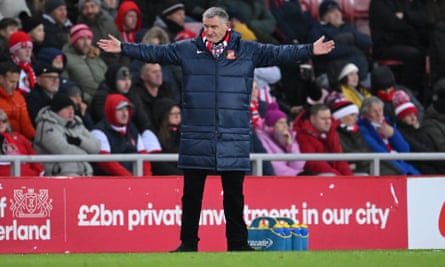
“Tommo, I have never ever presented to any club or board,” Mowbray replied. “I’ve sold myself on how I speak about football, the humility in me as an individual, how I work, how I live my life, how I like my team to play, how I expect the club’s brand to be represented. Once people listen to you and how you talk about football, it doesn’t matter what’s up on the screen.”
In the end, Thomson lost out to Jonatan Johansson, but he maintains to this day that the most important thing is to be himself at an interview. If he didn’t, would he have to continue the charade while in the post? Besides, the more young managers there are with laptops and data and philosophies, the more important it is for others to separate themselves with experience, personality and man-management skills.
“I could book an online course, jump on a Zoom call and learn how to do PowerPoint presentations in a few weeks, but what I’ve gained as an individual, from grassroots to a high level, in dressing-rooms, fighting injuries and now passing that experience on to players … I’m not sure there is a course you can learn that on.”
It has been a frustrating time for Thomson, especially when clubs round up the usual suspects and, in many cases, appoint from within – witness Fox at Dundee United, Steven MacLean at St Johnstone, Barry Robson at Aberdeen. “You are probably better being in a job and failing than being out of work and being successful. As time goes on, do people forget you? I think so. Does your profile become less relevant? Aye, probably. But what do you do?”
The danger is that managers become increasingly desperate and make bad decisions. They don’t do their due diligence. They don’t interview the interviewers. They have been so long out of the game that they overlook the warning signs and accept a job in which they are destined to fail. In the long run, they will still be unemployed, but with a poorer CV.
Pressley, who became the Falkirk manager when he was 36, regrets taking the plunge too soon and says that, if he had his time again, he would be cuter and more strategic with his career plan. “I always say to young managers ‘do your grass time’. That might take six or seven years, but in that time, you can try to position yourself at certain clubs where, if you do get the opportunity to manage, you will have the resources and the potential to do well.”
Those first couple of jobs are crucial to a manager’s career. If they are failures, it is all over. If they are successes, there is credit in the bank. McGhee’s early work at big clubs in England set him up for a long and varied adventure north and south of the Border, from Millwall and Brighton to Motherwell and Aberdeen, with a spell as Scotland’s assistant manager thrown in for good measure.
The former Aberdeen and Celtic striker is proud of his life in football, but latterly his experiences with Barnet, Eastbourne Borough and finally Dundee, where his emergency fire-fighting exercise resulted only in relegation, were not so fulfilling. After that ill-fated spell at Dens Park in 2022, he effectively retired.
Now 67, with nearly 1,000 matches behind him as a manager, does he miss it? “I don’t,” he says. “I feel hugely privileged to have done what I’ve done, but I had had enough of it. Physically, I could no longer do it and, mentally, I just don’t care enough. As a manager, you need to be kept awake by results. If you start going to sleep easily, even when you have lost, you know it’s time.”
Back home on the south coast of England, McGhee has taken to pursuing “business interests”, which is among those pastimes – together with seeing more of the family and getting the golf handicap down – listed as a consolation for unemployed managers.
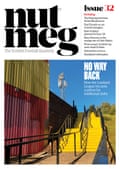
The former Hamburg player has reinvented himself as a “facilitator”, by which he means that he brings people together. One of his ventures involves a friend in Germany, who has been given a licence to sell Adidas clothing. When McGhee was asked if he could help them out in the UK, he said “why not?”, identified a few retail outlets and arranged some of the logistics.
“It’s funny: I thought I’d be going to the post office to pick up a parcel. Or to a container where there would be a few hundred pairs of shoes. But when I contacted the transport company, they told me they would need nine articulated lorries. That’s how much gear it was. I’m doing things now that are so far removed from football it’s ridiculous.”
Nearly 26 years on from that first sacking at Wolves, McGhee is happy to be out of management. After all this time, he is now content to sit back, relax and let the rat race rage on in his absence. And who can blame him?
Source: theguardian.com

